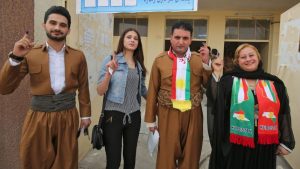About five million people in Kurdish-majority areas of northern Iraq are eligible to take part in a non-binding referendum on independence from Iraq on Monday,like reported by haaretz.com. They will be asked to check a yes/no box next to the question, “Do you want the Kurdistan region and the Kurdish areas outside the region’s administration to become an independent state?”
Who are the Kurds?
The Kurds are the largest ethnic group left stateless when Britain and France, the colonial powers which won World War I, carved up the Ottoman Empire. The region’s roughly 30 million ethnic Kurds were left scattered, mainly over four countries: Iraq, Iran, Turkey and Syria. The Kurdish population suffered persecution and were often denied the right to speak their language.
Why the referendum?
The autonomous Kurdistan Regional Government in northern Iraq says the Shi‘ite-ruled central government in Baghdad has failed to respect autonomy established after the 2003 overthrow of Saddam Hussein in a U.S.-led invasion.
Why now?
The KRG says the vote acknowledges the Kurds’ crucial contribution in confronting Islamic State after it overwhelmed the Iraqi army in 2014 and seized control of a third of Iraq.
What’s the likely outcome and what’s next?
The outcome is likely to be a comfortable “yes.” The KRG, led by Massoud Barzani, plans to use the vote as a legitimate mandate to press for negotiations with Baghdad and neighboring countries to achieve independence.
Why is Baghdad opposed to the vote?
The Iraqi government thinks the vote could lead to a messy breakup of the country at a time when it is struggling with reconstruction and the return of refugees. It offers talks to resolve disputes over land, energy and power sharing, including the status of the multi-ethnic oil region of Kirkuk.
What is Israel’s position? Earlier this month, Prime Minister Benjamin Netanyahu said Israel supports the establishment of an independent Kurdish state. Senior Israeli officials have said that Netanyahu’s comments reflect the official Israeli policy on the matter in light of the referendum.
A number of senior Israeli officials, including the late President Shimon Peres and Defense Minister Avigdor Lieberman, have in the past expressed support for Kurdish independence. Earlier this month, Justice Minister Ayelet Shaked said: “Israel and countries of the West have a major interest in the establishment of the state of Kurdistan. I think that the time has come for the U.S. to support the process.”
Why are Turkey and Iran opposed to the referendum?
Iraq’s powerful neighbors fear separatist contagion for their own Kurdish populations. Turkey is home to the largest Kurdish minority. It has been fighting Kurdish insurrection in its southeast since 1984. Iran’s Kurds are close culturally to Iraq’s Kurds and they speak the same Kurdish language. Tehran is also close to the Shi‘ite political parties who have been ruling Iraq or holding key security or government positions since 2003. Syria’s own Kurds are also pressing for self-administration.
Which other countries oppose the referendum?
Just about every global power opposes the vote, including the U.S. and the United Nations, which fear a destabilization of Iraq while the war with Islamic State is not yet over. The Kurdish leadership knows that the establishment of a sustainable independent Kurdish state depends first of all on the consent of Turkey, Iran, Iraq and Syria, more than on that of the United States. Any of those countries could easily strangle an incipient Kurdish state economically.
The Kurds will have to persuade the countries in the region and the West that an independent Kurdistan will serve their strategic and economic interests as well. For example, the Kurdish leaders could claim that establishment of a state will end the struggles their forces are waging in Syria and Turkey because their main demand, for independence, will have been met.



